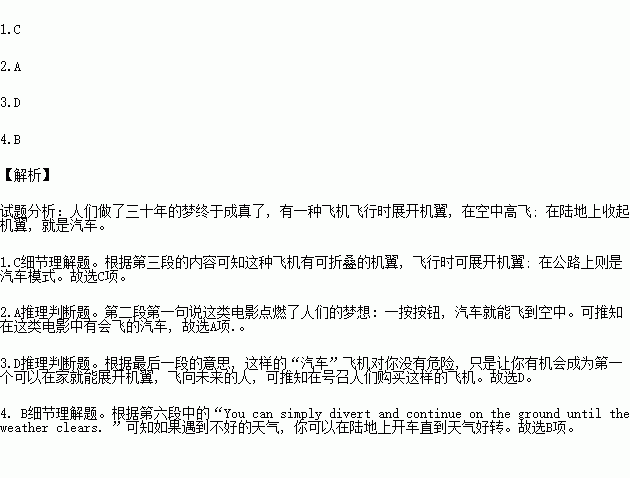题目内容
It has been a dream for 30 years but now the world’s first flying car is set to hit the roads this year.
Ever since the “Back to the Future” movies lit up our screens in the 1980s,designers have dreamt of cars that could take to the sky at the push of a button.And now pilots can order their own “roadable” plane for just £ 127,000.
The plane, which has fold-out wings that span(翼展)17.5ft,has a range of flying distance of 460 miles and can be up to 115 mph.Back on the land,it can also travel at“highway speeds”in car mode(模式).
Fueling the 19ft. long plane couldn’t be simpler----you just drive it into a petrol station and fill it up.
A spokeswoman said, “You can keep you ‘light-sport airplane’ in your garage.But because it needs a short runway to take to the air, you will have to drive to your local airport,fly up to 460 miles, land,and drive directly to your destination.You will always be ready to drive or fly."
The spokeswoman added,“Never let bad weather change your trip.You call simply divert(改道)and continue on the ground until the weather clears.”
There is no risk to you—This is only the chance for you to be the first at your home field to unfold your wings and fly into the future.
1.According to the text, the“roadable”plane________.
A. can fly at“highway speeds”in car mode
B. is 19ft long and 17.5ft wide inside
C. is a kind of car with fold-out wings
D. can only travel on the highway
2.We can infer that in the“Back to the Future”movies_________. ‘’
A. cars can fly in the sky
B. pilots have no cars to drive
C. pilots can’t afford a“roadable”plane
D. there are some skillful pilots
3.The last sentence of the text aims to__________.
A. ask people to unfold their wings and fly into the future
B. show people the use of the“roadable”plane
C. tell people only the“roadable”plane can fly in the future
D. call on people to buy the“roadable”plane
4.If you meet with a thunderstorm in your“roadable”plane in the skies,you can ________ .
A. land in a nearby airport until it clears
B. 1and and drive on the ground
C. turn back home until it clears
D. fly high up to 460 miles

